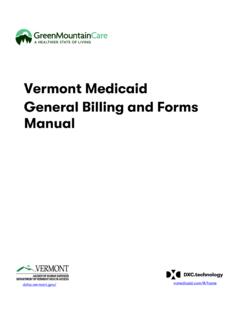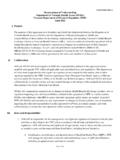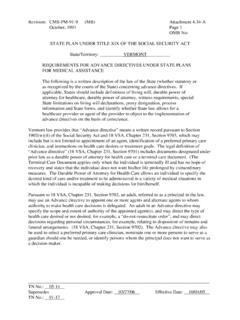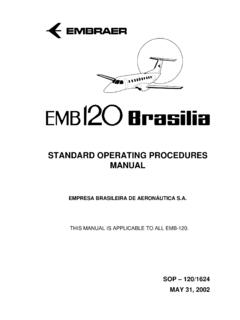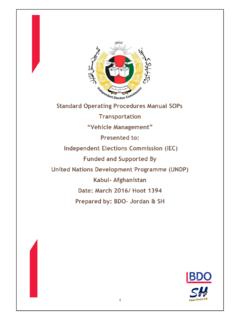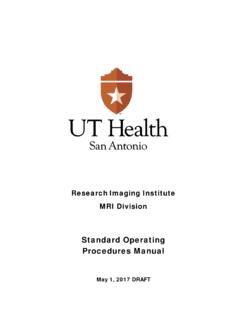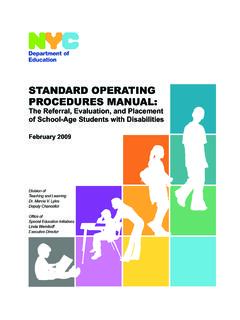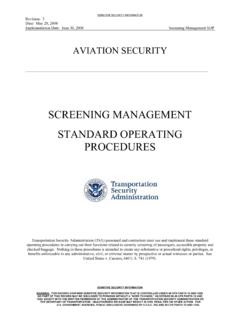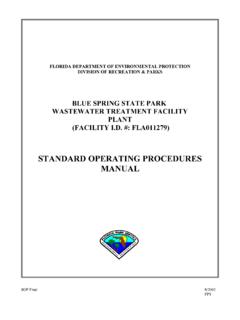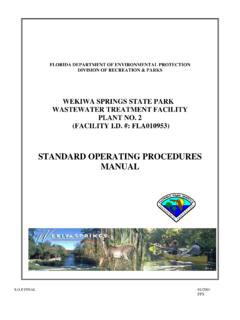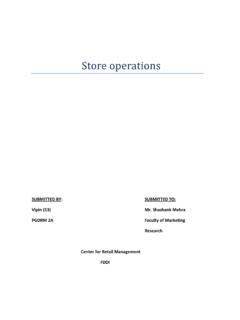Transcription of STANDARD OPERATING PROCEDURES MANUAL
1 Agency of Human Services STANDARD OPERATING PROCEDURES MANUAL FOR VERMONT MEDICAID INPATIENT PSYCHIATRIC AND DETOXIFICATION AUTHORIZATIONS Department of Vermont Health Access Department of Mental Health Revised March 12, 2013 2 Table of Contents I. Page 3 II. Children and Adolescents Psychiatric Page 7 III. Voluntary Adults (non-CRT) Psychiatric 11 IV. Medically Managed 13 V. Community Rehabilitation and Treatment (CRT).. Page 15 VI. Involuntary Admissions/Emergency 17 VII. Secondary Page 21 VIII. Sub-Acute and Awaiting Placement Page 23 IX. Appeal of Payment Page 25 X. Inter-Rater Page 27 XII. Program Integrity ..Page 29 XII. Attachments Attachment 1: Vermont Medicaid Child and Adolescent Inpatient Notification Page 31 Attachment 2: Vermont Medicaid Admission Notification Form For Psychiatric Inpatient 33 Attachment 3: CRT Crisis Intake Page 34 Attachment 4: Vermont Department of Mental Health Commissioner-Designated Qualified Mental Health Professional (QMHP).
2 Page 36 Attachment 5: Request for Secondary Review of Inpatient Psychiatric 38 Attachment 6: DVHA Appeals Process for Patients And 39 Attachment 7: Mental Health 24 Hour Emergency Services Children up to Age Page 40 Attachment 8: Adults Ages 18 and Over Psychiatric Crisis Page 41 Attachment 9: Substance Abuse Page 42 Attachment 10: Application for Emergency Page 45 3 INTRODUCTION This MANUAL describes processes to be followed by admitting facilities, the Department of Vermont Health Access (DVHA) and the Department of Mental Health (DMH) when Medicaid primary beneficiaries are hospitalized for psychiatric or detoxification services. Acute inpatient mental health treatment is the most intensive level of psychiatric care.
3 Treatment is provided in a 24-hour secure and protected, medically staffed environment with a multimodal approach. The goal of the inpatient stay is to stabilize the individual who is experiencing an acute psychiatric condition with a relatively sudden onset, severe course, or a marked decompensation due to a more chronic condition and in order to transfer the person to a less restrictive level of care. Detoxification means the planned withdrawal of an individual from a state of acute or chronic intoxication, under qualified supervision and with or without the use of medication. Detoxification is monitoring and management of the physical and psychological effects of withdrawal, for the purpose of assuring safe and rapid return of the individual to normal bodily and mental function. (Vermont Statutes, Title 33 702). Inpatient detoxification refers to the medically managed treatment regimen used to support the withdrawal of the addictive substance.
4 Utilization/Care Management System In 2012 the Department of Mental Heath (DMH) and the Department of Vermont Health Access (DVHA) collaborated to create a utilization management system for all Medicaid funded inpatient psychiatric and detoxification services. In response to the closing of Vermont s State Hospital and the resulting decrease in the number of available psychiatric inpatient beds, the DMH formed an expanded Care Management Unit to actively support the system of care in Vermont. The goals for the utilization/care management system are as follows: Clinical care is provided only as long as necessary for safety and/or other acute needs. There are standardized criteria for admission, continued stay and discharge throughout the system of care. Care is continuous between the ongoing community treatment teams and episodes of inpatient care. Ideally the hospital and community teams develop and share a common treatment plan developed in partnership with the individual and their family, beginning within 24 hours of admission.
5 Resources of the public system are effectively and efficiently used. The care management system will ensure access to effective, appropriate, recovery-based services that promote an individual s mental wellness and resiliency, and support successful integration into the community. The utilization review (UR) staff are available Monday Friday, 7:45am 4:30pm (excluding holidays). All decisions regarding authorization for nights, weekends and holidays will be made during regular business hours. Should the situation arise outside of the regular business hours in which the clinical presentation of a beneficiary changes and 4 additional days are needed, the inpatient facility will notify the UR staff on the next business day and provide the clinical justification for the additional days needed. Every effort will be made to render an authorization decision at that time, but no later than the end of the business day.
6 Any cases that do not meet criteria, or where there is a potential to deny a service authorization request or to authorize a service in an amount, duration, or scope that is less than requested will be referred to a health care professional who has appropriate clinical expertise in treating the beneficiary s condition or disease for determination. This would include currently licensed mental health professionals such as a Licensed Clinical Social Worker (LCSW), Licensed Psychologist, Licensed Clinical Mental Health Counselor (LCMHC), Licensed Alcohol and Drug Counselor (LADC) or a physician. The DVHA and the DMH will have in effect inter-rater reliability mechanisms to ensure consistent application of review criteria for authorization decisions. Retrospective Review The DVHA and the DMH will not perform retrospective reviews for the purpose of reviewing authorization decisions and recoupment of payments except in the case of material misrepresentation or fraud.
7 Retrospective Authorizations It is the responsibility of the provider to notify the DVHA or the DMH of an inpatient admission and to initiate and complete the concurrent review process. As such, the DVHA and the DMH are under no obligation to perform retrospective authorizations due to lack of notification. Requests for retrospective authorizations due to lack of notification by the provider are considered solely at the discretion of the DVHA and the DMH. In the instance of a beneficiary whose Medicaid eligibility becomes retroactive to the time of the inpatient hospitalization, but who at the time of admission was not eligible for Medicaid, the provider may request that the DVHA or the DMH complete a retrospective review for authorization. The request, either orally or in writing, is made to the DVHA or the DMH. The supporting clinical documentation demonstrating that the inpatient level of care criteria were met for the days requested must be submitted for review.
8 The DVHA or the DMH UR staff will make an authorization determination within 14 days. Requests for a retrospective authorization may be made to the DVHA Senior Behavioral Health Care Manager by phone at 802-879-8232 or in writing to: The Department of Vermont Health Access ATT: Quality Unit 312 Hurricane Lane Suite 201 Williston, VT 05495 5 Contact Information Admission Notification (855) 275-1212 (Toll-free Fax) Department of Vermont Health Access (DVHA) (802) 879-5900 (Phone) Department of Mental Health (DMH) (802) 828-1723 (Phone) (802) 828-1720 (Phone) (802) 828-1717 (Fax) 6 This page intentionally left blank 7 CHILDREN AND ADOLESCENTS PSYCHIATRIC ADMISSIONS Criteria for Inpatient Hospitalization: To ensure that mental health services are provided at an appropriate level of care and within the appropriate utilization of resources, the Department of Vermont Health Access (DVHA) has adopted the Child and Adolescent Level of Care Utilization System (CALOCUS) instrument for determining authorization for psychiatric inpatient level of care.
9 The CALOCUS guidelines represent a resource efficient evidence-based approach to the management of inpatient admissions and continued length of stay. The CALOCUS provides a framework for defining the appropriate intensity of services and resources to meet the needs of children and adolescents. The instrument is a method of quantifying the clinical severity and service needs of three quite different populations of children and adolescents. It may be used in children with psychiatric disorders, substance use disorders, or developmental disorders. Admission Process: Youth whose primary insurance is Vermont Medicaid are assessed by designated Emergency Services (ES) staff from the Vermont Community Mental Health Centers (CMHC) prior to being admitted to a psychiatric inpatient facility. The purpose of assessment prior to an inpatient admission is for continuity of care, identification of intervention strategies, and appropriate determination for involuntary hospitalization.
10 This includes assessment for less restrictive alternatives and review of any existing crisis plan for the youth. An inpatient psychiatric admission may be recommended or supported by the ES staff when: 1. The youth is in need of hospitalization based on admission criteria, and 2. Community and support system resources are exhausted, and 3. A less restrictive alternative is not available ES staff is provided with an admission notification form that includes a list of available resources that must be contacted in order to make decisions related to appropriate level of care and treatment options (Attachment 1). This admission notification form must be faxed to the Department of Vermont Health Access (DVHA) by the next business day following an admission and reflect inpatient criteria met, as well as alternatives considered and reasons for ruling them out. The ES staff also arranges for transportation and admission to a psychiatric inpatient facility.

